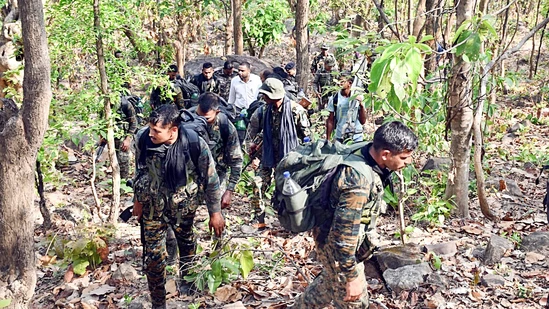Security forces achieved a major breakthrough in the fight against Left Wing Extremism with the killing of top Maoist leader Nambala Keshav Rao, also known as Basavaraju, in an intense encounter in the Abujhmad forests of Chhattisgarh.
Basavaraju, the general secretary of the banned CPI (Maoist), was among 26 Maoists neutralised during the operation, one of the most impactful anti-Maoist successes in recent years.
Basava Raju, aged around 70, had been one of India’s most wanted Maoist leaders, carrying a reward of ₹1.5 crore on his head. A native of Jiyannapeta village in Andhra Pradesh’s Srikakulam district, he held a BTech degree from the Regional Engineering College (REC) in Warangal.
He had joined the Maoist movement in the 1970s and was known for operating under multiple aliases, including Ganganna, Krishna, Narasimha, and Prakash.
He became general secretary of the CPI (Maoist) in 2018, succeeding Ganapathy, also known as Muppala Lakshman Rao, who was the party’s first general secretary after the merger of the People’s War Group and Maoist Communist Centre (MCC) in 2004.
Ganapathy is believed to have fled to the Philippines, after leading the party for over a decade. Basava Raju was widely feared for masterminding some of the deadliest Maoist attacks in India.
Raju was the main planner of major Maoist attacks
The Maoist leader played a key role in the 2010 massacre of 76 CRPF jawans in Chintalnar, Chhattisgarh, and the 2013 ambush at Jhiram Ghati, where several Congress leaders were killed in a brutal assault.
He also did not have any recent photograph on record, making him extremely difficult to track. His areas of operation mainly included Chhattisgarh, Telangana, and parts of Maharashtra.
Basavaraju was instrumental in the formation of the CPI-ML (People’s War) in 1980 and rose through the ranks to become part of its central committee in 1992.
After the 2004 merger that formed the CPI (Maoist), he was appointed secretary of the central military commission, where he oversaw armed operations and strategy.
His death is being seen as a major setback for the Maoist movement, which has suffered significant losses in recent years.
